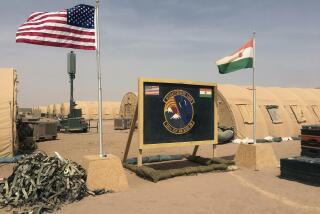Libya, the anti-Iraq
A top U.S. envoy arrived in Libya’s capital Wednesday bearing best wishes but no promises of cash, no battalions of troops, no stocks of armored Humvees or blast barriers — and no blueprints for rebuilding a nation.
It is early yet, less than a month since Tripoli fell and Moammar Kadafi disappeared. He is still out there somewhere, urging allies who retain control of several cities to “turn Libya into true hell,” as his spokesman said in a new audio message.
The future is uncertain. The political process is frenzied and bewildering; hosts of gun trucks and Kalashnikov-wielding rebels patrol the streets.
But in at least one key respect, Tripoli has become a kind of anti-Baghdad: a capital where the longtime tyrant has been sent packing, yet where no foreign troops are on the ground. Normality appears to be taking hold, and it is Libyans themselves who are calling the shots.
It seems unlikely there will be any need for either U.S. troops in the country or the trunkloads of hundred-dollar bills and costly Iraq-style “reconstruction” teams that drained the U.S. Treasury while the battle with insurgents was costing thousands of American lives.
In an era defined by tight budgets in Washington, Assistant Secretary of State Jeffrey Feltman said Wednesday, “Libyans will lead the way forward.”
“We are going to be guided by what Libyans themselves think is appropriate for the U.S. and the international community to do,” Feltman said. “This was a victory by the Libyan people, and Libya’s destiny must be decided by Libyans alone.”
Ali Tarhouni, the acting finance minster, said Libya was a rich country and wasn’t looking for handouts. Limited production of oil, Libya’s major income generator, has resumed. The nation’s transitional rulers will have many more resources when a fortune in foreign assets is unfrozen.
Perhaps wary of any comparison with Iraq, U.S. officials seem disinclined to declare “mission accomplished.” NATO allies seem less cautious. Libyan officials said British Prime Minister David Cameron and French President Nicolas Sarkozy would arrive Thursday to mark what both view as a foreign policy success.
In Tripoli, even as a plethora of groups vie for inclusion in the new government, there are fewer and fewer checkpoints. Most of them are rather informal affairs, nothing like the chilling, ambush-prone roadblocks long manned by edgy U.S. troops in Baghdad.
There is little noticeable tension between the men with the guns and the general population. Residents lavish praise on their rag-tag liberators.
“I think if there were foreign troops here things would be much different,” said Najwa Shalabi, who was taking her four children to a small seaside amusement park. “We trust the freedom fighters. They are Libyans all.”
Recent evenings have even featured groups of noisy street protesters whose central point was encapsulated in one banner: “No to extremism!”
“We hope Iraq can be like us someday,” said Shalabi, before escorting her children toward the rickety-looking carnival rides.
Libya, home to about 6 million people, is thinly populated compared with Iraq, and it doesn’t suffer from Iraq’s profound sectarian divisions. It does, however, have many tribes and clans, some of them longtime rivals.
People here routinely smile at Westerners and offer thanks for the NATO bombing campaign that was essential to the rebels’ victory.
“We were just hungry for freedom,” said Abdul Wahab Zietni, 31, an unemployed teacher, expressing a widespread sense of joy. “We have lived too long with tyranny.”
More and more shops are opening, traffic clogs the streets, families go out for walks, citizens crowd cafes and there is running water and power — the latter something that still hasn’t completely returned to Baghdad, more than eight years after U.S. forces toppled Saddam Hussein.
Of course, it took several months after Baghdad’s fall for car bombs and sectarian slayings to turn the Iraqi capital into a charnel house.
Libya’s new authorities pledge to extend their control to the towns still held by Kadafi loyalists in their own way — preferably through negotiation. But it’s looking more likely that they will have to capture them by force. The front-line outside of Bani Walid, one of the Kadafi bastions, is crowded with civilians-turned-rebels eager to charge in.
Whereas Iraq was a U.S. war of choice, Libyans say, their rebellion against Kadafi was a conflict of necessity.
“From the beginning of the revolution, we felt safe here among our fellow Libyans who were willing to die so we could all be free,” said Ramadan Dughri, 49, a customer service representative, who was also at the amusement park with his family. “It’s good for the Americans too: They don’t have to secure our country.”
More to Read
Sign up for Essential California
The most important California stories and recommendations in your inbox every morning.
You may occasionally receive promotional content from the Los Angeles Times.









